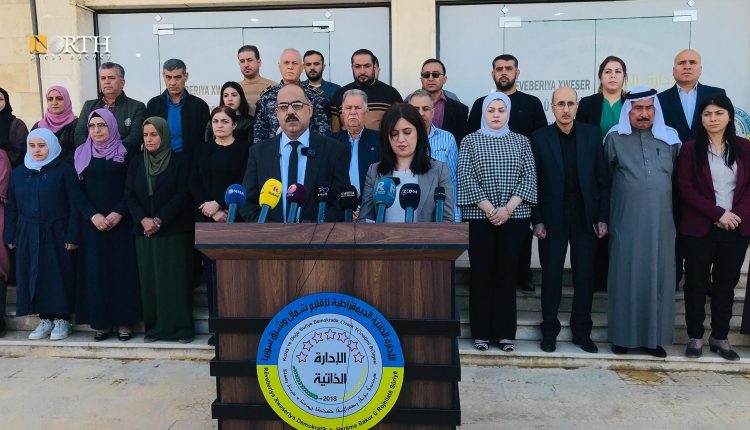AANES says Turkey launches over 1,000 attacks on northern Syria
RAQQA, Syria (North Press) – The Autonomous Administration of North and East Syria (AANES) announced on Sunday that Turkey has carried out over a thousand attacks on northern Syria, which jeopardizes the safety of facilities housing members of the Islamic State (ISIS) and threatens the lives of millions of residents.
In an official statement read in front of its headquarters in the city of Raqqa in northern Syria, the AANES said that Turkey has conducted 1,031 attacks, resulting in 17 killings and 65 injuries. These attacks included 118 drone strikes, 20 air raids, and 893 mortar and artillery shelling.
In its statement, the AANES condemned these “unprovoked attacks,” asserting that they aim to exacerbate existing economic crises by targeting vital infrastructure and essential services.
This escalation threatens the well-being of approximately five million people, including both indigenous residents and displaced individuals living in the AANES areas.
The AANES highlighted that such aggression poses a significant risk to humanitarian, social, and service conditions, creating an environment conducive for terrorist cells to strengthen their presence and prepare for further attacks.
Moreover, it stressed that Turkish military actions undermine stabilization efforts and jeopardize counter-terrorism initiatives being carried out by local security forces in collaboration with the Global Coalition.
The statement urged Global Coalition forces, Russia, and all human rights and humanitarian organizations to acknowledge the implications of these aggressive actions, take measures to halt them, and establish investigative committees to hold those responsible accountable.
Over a span of four days, Turkey bombarded service facilities in northern Syria, leading to both human casualties and extensive material damage.
The bombardment has disrupted electricity stations serving cities such as Qamishli, Kobani, Amuda, and Derbasiyah, resulting in power outages that have affected more than 150,000 families, along with causing water shortages.

